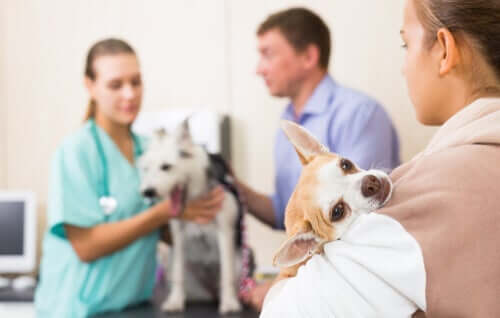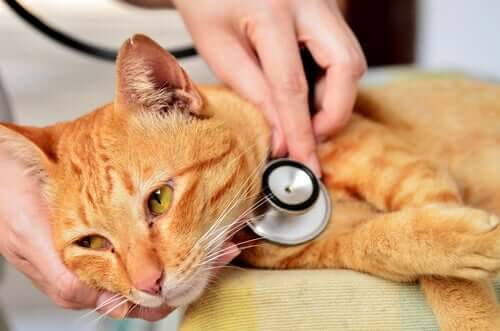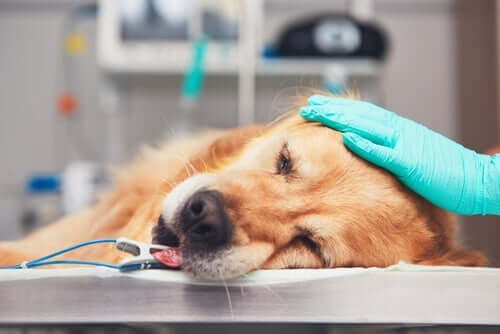Veterinary Emergencies During Lockdown

Veterinary emergencies come when we least expect them. They can happen at any time, whether we’re on lockdown or not. And if you’re a pet owner, you need to be prepared at all times. This means understanding guidelines in order to avoid violating the law and being penalized.
Below, we’ll tell you more about this issue as well as offering some useful advice. Of course, these tips don’t replace professional recommendations for each individual case.
Just as walking your dog is an exception to stay-at-home orders, visiting the veterinarian in the case of an emergency is also permissible. However, on many occasions, deciding whether the need is urgent or not can be confusing. At the same time, we need to pay attention to what the authorities post on social media.
Veterinary emergencies during lockdown
The classification system, depending on the seriousness of a patient’s state of health, is known as triage. This system has proven to be very effective and helps prioritize the cases where a patient’s life is truly at risk. Veterinarians use this system to be sure to provide care to animals that are most in danger.

For this reason, when a person seeks emergency medical care for pack pain, doctors may take hours to tend to them. And although it may seem exasperating, there’s a good reason behind this extended waiting time.
On the basis of these criteria, triage divides patients into 5 levels :
5. Non-urgent: The patient’s life is not in danger and the problem is completely minor. For example, muscle pain.
4. Less urgent: Tentatively, there is no risk to a patient’s life. For example, gastroenteritis.
3. Urgent: The patient does have a serious condition that requires emergency care, but his or her vital signs are stable. For example, a fractured limb.
2. Emergent: The patient requires stabilization because his or her health is in critical danger. For example, a patient may have massive bleeding due to a deep cut.
1. Resuscitation: Absolute priority, lack of vital signs. For example, a heart attack.
This is, in broad terms, the system of classification for the state of health of patients. This acuity scale is what influences decision-making when it comes to urgent care.
What levels require immediate veterinary attention?
In general, levels 1, 2 and 3 are those that, without a doubt, require emergency veterinary attention. On certain occasions, animals that fall into level four may also require urgent care.
Level 5 never requires emergency care. Therefore, cases of animals that are in triage level 1 are not considered veterinary emergencies during lockdown, until by specific veterinarian recommendation. It’s important to point out that veterinarians follow these guidelines, transferring possible real situations on the basis of these different levels, always as a means of reference.
Veterinary emergencies during lockdown: when to see a vet
As pet owners, it can be difficult in certain circumstances to discern whether or not our pets are in real danger. If in doubt, you should always contact a veterinarian you can trust. The professional will decide if your pet requires urgent care or not, based on the information you provide.
Below, we’ll look at some situations that may arise during lockdown and whether or not they require urgent care.
Non-urgent situations
In general terms, we can include skin conditions, such as alopecia or comedones (pimples). These processes are quite frequent in pets and are not indicative of a serious health problem.
Another common situation consists of animals with respiratory symptoms as well as coughing and sneezing. As long as these symptoms don’t persist over time, like skin conditions, they generally don’t count as veterinary emergencies.
Diarrhea is becoming a common issue during quarantine. Perhaps because, while we’re spending more time at home, we have a greater tendency to pass the time snacking on junk food along with our pets.
Cases of diarrhea in pets are usually self-limiting and go away on their own in a few days. Therefore, in general, they don’t require urgent care. However, there are some exceptions, including older dogs, puppies, dogs with associated illnesses, or persistent diarrhea over time.
Veterinary emergencies or situations that justify consultation

Among situations that require consultation, we can include any circumstance that represents a real risk for pets. For example:
- Severe gastrointestinal processes: Diarrhea that lasts for several days, and diarrhea along with vomiting or decline can be reasons for seeking urgent care.
- Accidents: An accident is always a potential reason for seeking emergency care from a veterinarian. For example, small cuts should be evaluated and disinfected. Also, a vet should apply the necessary measures to prevent tetanus.
- The ingestion of foreign objects or toxic substances: Given the current reduction in physical activity, many pets can develop strange behavior as a result of stress. This state may lead them to ingest elements that aren’t fit for consumption.
- Fainting: Even if it’s just for a moment, fainting or sudden loss of consciousness always calls for emergency veterinary attention. This situation requires the proper evaluation of an animal’s state of health as well as possible treatment.
- Fever/decline: If an animal’s health is declining or you notice your pet has a fever or is giving off heat, you should check with a veterinarian. This is especially true if the situation persists for more than a day.
These are some of the most common situations that may arise during this time you’re at home with your pets. However, this list is by no means complete.
Once again, in any situation, remember that the best thing you can do is contact your veterinarian and follow his or her instructions regarding whether or not to seek urgent care.
